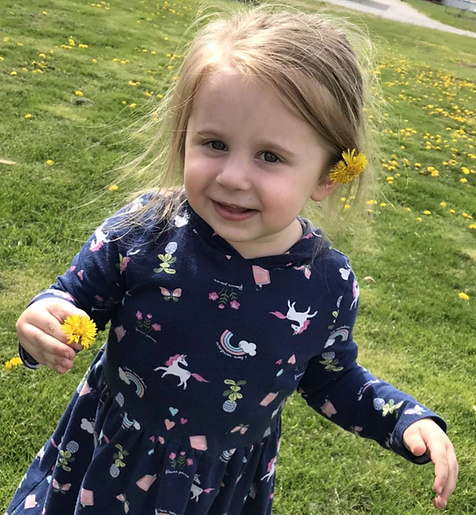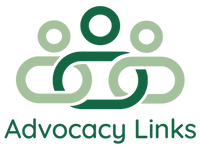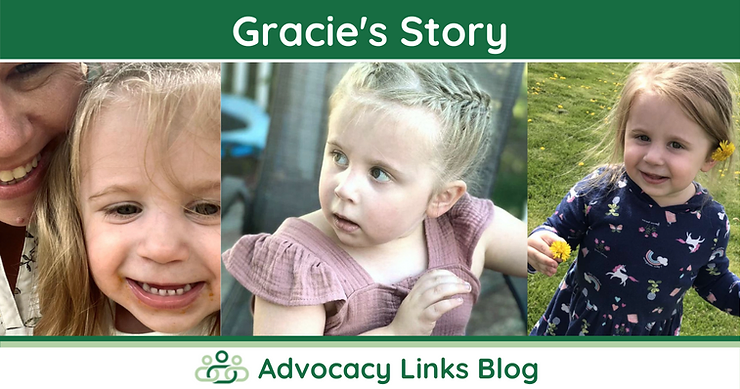Gracie is a bright and beautiful 4-year-old girl that is likely using her charm to hide a multitude of hidden plans to take over the world. She lives with her parents and 3 of her siblings in a small rural town in north-central Indiana. Her mother, Sara, has worked in social services for about 15 years, primarily working with individuals with developmental disabilities. This writer has worked with Sara for nearly 4 years, with 3 of those years in Medicaid Waiver Case Management.
Everyone agrees that Gracie is perfect as she is. She has the unwavering support of awesome, dedicated parents and family. The reality though is that her perfection includes a set of challenging physical limitations in her fine and gross motor skills and her vestibular system. She is perfect, but she and her family need information and validation. They need the supports and services that come with a formal diagnosis, which so far has been elusive despite their extensive efforts.
Gracie’s perfection – and her unquestionable ability to use her big personality for world domination – includes daily struggles that could be eased and barriers that could be lifted. Her perfection comes with sass and grit. It includes blessings and challenges. It sees the whole picture of who she is and how she meets all this with grace even as a 4-year-old little girl. No one will ever tell her that world domination is easy, but maybe there are ways to help make a 10-minute car ride easier.
This is Gracie’s story. Her mother, Sara, agreed to allow me to interview her regarding their experiences as they have identified concerns in Gracie’s development. They have gone through a myriad of appointments, and testing, and jumped through proverbial hoops to try to find answers for the set of challenges that Gracie experiences daily.
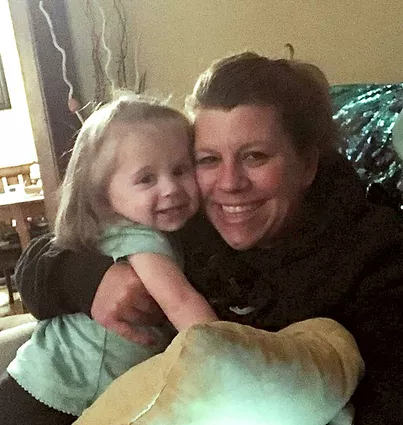
ABOUT GRACIE
What should I call her? Grace or Gracie?
I call her Grace, but she prefers to be called Gracie. Fun fact: Her legal name is Gracelyn. She does not love it!
How old is Gracie? Is she in school yet?
She is 4. She is currently in a developmental preschool. Developmental Preschool provides special education programs for children 3-5 years of age.
Where does she really excel? What comes naturally to her? (Other than sass. I know the term “fournado” has been used regularly!)
She excels at so many things! Sass is definitely at the top of the list, but she is full of confidence that I pray the world never takes from her. Gracie is an absolute social butterfly, and she makes friends everywhere we go.
Her persistence has its own zip code. She is a natural leader/take charge kind of girl. She is observant, very smart, and works hard at school and in therapy.
While I would never call her “easygoing”, she is adaptable and doesn’t mind schedule changes for her multitude of appointments. We tell her where we’re going and what is going to happen as well as we can, and she goes right along with it. She loves to charm and entertain!
What does Gracie say she’s REALLY good at doing?
“I really good at shaking” *proceeds to shake her booty*
What does she struggle with? Where does she have to work harder?
We didn’t receive referrals for First Steps until she was 15 months. She still wasn’t pulling up, walking, or crawling. Once we started in First Steps, we found she had fine and gross motor delays along with vestibular issues. This was the first time I had ever heard this term. (The vestibular system is a sensory system that is responsible for providing your brain with information about motion, head position, and spatial orientation; It also is involved with motor functions that allow us to keep our balance, stabilize our head and body during movement, and maintain posture. NeuroscientificallyChallenged.com)
Her vestibular issues cause more challenges than I could have ever imagined. It affects her balance and coordination, and it causes her to have difficulty with her vision. She has challenges with tracking objects, gets double vision, and has limited peripheral vision. Subsequently, this causes her to get motion sick frequently, even on very short drives or with rapid movement.
As of today, while Gracie can walk, she does struggle with balance and coordination the most. She tires quickly. She has a huge vocabulary, but her speech can get sloppy and difficult to understand especially if she is tired or excited.
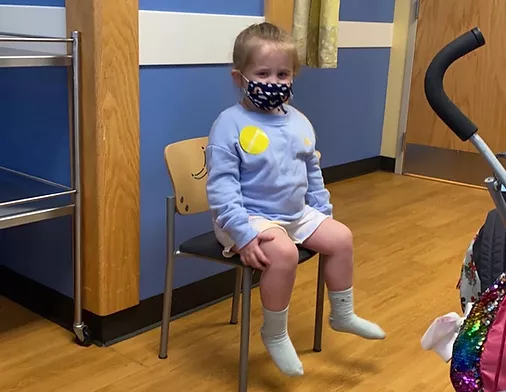
GRACIE’S MEDICAL CHALLENGES
What are the primary medical concerns she faces with these issues?
Most of her challenges are physical, and she has some medical issues mixed in due to hypotonia.
Medically she has a weak diaphragm that can cause breathing issues. Physically she has low muscle tone and joint hypermobility as well as problems with her vestibular system. In addition to the things we’ve already discussed, she experiences frequent falls and is at high risk for breaks/dislocations.
Her vestibular issues cause an array of concerns, but the worst is motion sickness. She can get sick on a 10-minute car ride, or just going a few blocks. She visits multiple therapists and specialists, none of which are located close to home, so the idea of having to travel an hour away for an appointment is cringeworthy! We carry a bowl and extra clothing everywhere we go. Emotionally, she’s great and generally unbothered by any of this!
Does she have a formal diagnosis? I know this has been something you have been struggling with.
Her official diagnosis is Global Developmental Delay. She has what are considered symptoms: Low muscle tone (Hypotonia) and joint hypermobility. The thought is that she has some type of hypermobile disorder, but those can’t be diagnosed until the age of 6.
Are supports and services hard to come by in your small town?
Finding local or relatively close specialists, supports, and services is a huge struggle! She does use Speech and Physical Therapy (PT) at school during the school year.
Other than the services at school, there’s absolutely nothing offered in our small town, and not having a formal diagnosis is an additional layer of limitations.
We take Gracie to a private PT and Occupational Therapist (OT), and we travel to a neighboring city about 20 minutes away for those appointments.
What type of doctors/specialists has she seen?
This is quite the list! She currently uses Neurology, Physical Medicine & Rehabilitation, Orthopedics, and Developmental Pediatrics. She is also seen at the Neuromuscular Clinic at Cincinnati Children’s Hospital.
Recently, she’s gotten referrals for Ear Nose & Throat (ENT), and Gastrointestinal (GI) In Indy, and she will see them both this summer.
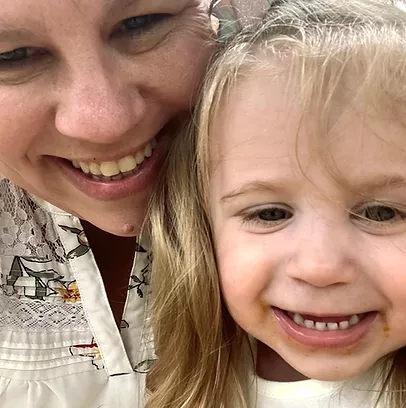
Sara’s Experiences
You have an extensive work history in the healthcare field, particularly working with people with disabilities. Do you feel like your professional background has helped you navigate doctors/services?
In some ways, yes. It gave me a deeper understanding of what to expect from trying to fight through the different systems and what was available to her. It has helped me advocate for her.
I felt equipped with the knowledge of who to go to when things didn’t seem right, and where to turn when I didn’t know what to do. I have a great tribe of people.
I always felt that I was empathetic to what the families I was working with were going through in these situations. I have learned that even though I genuinely tried to understand, I truly had no clue how frustrating these systems are for families and parents, or how much stress and time accompany these processes. Our life with Grace has been fairly simple compared to what so many go through, and I still feel like I’m losing my mind daily. I thought I was prepared because I have all the people and resources at my fingertips, but the lack of a diagnosis still leaves us in a world where we feel like we’re on our own.
When there isn’t anything to call “it” you spend a lot of time feeling like maybe nothing is really there. I have a strong personality myself, but even with that, and my experience, and our awesome tribe of people surrounding us, there truly is no way to prepare for the life that accompanies a child with extraordinary needs.
What were your initial experiences when trying to raise your concerns for Gracie with her doctors?
For the first two years of her life, every concern I took to her doctor was dismissed or written off. It made me feel like I was a parent that was looking for problems or someone that had no knowledge of kids. (She is the baby sister of multiple older siblings!). It was difficult to get to a point where my concerns weren’t being dismissed. We had to switch pediatricians to get there.
It wasn’t until we started First Steps and found a great Developmental Therapist that I started to feel listened to. Her Developmental Therapist was key in helping me advocate and gave us a lot of moral support.
Gracie now has teams of doctors but aside from reading each other’s notes, it seems like none of them speak with each other. I spend a lot of time repeating information and still rarely get answers. I hear “it’s not this, but maybe that,” “we need to refer you to someone else,” OR “we know her issues are probably this but she’s too young to officially diagnose.”
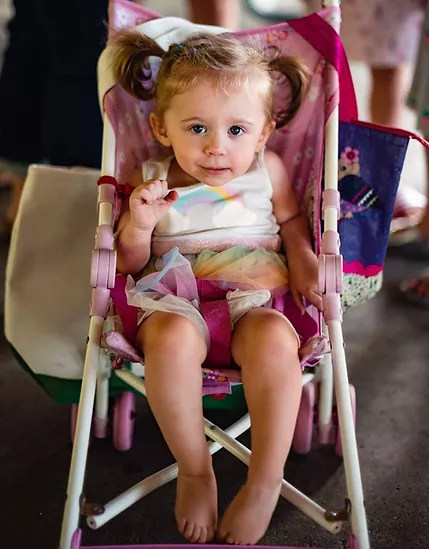
Is Gracie’s medical insurance tolerant of the assessments/specialists she’s needed to see?
Getting insurance approvals for specialists or the neuromuscular clinic she visits was not a problem. However, I could go on a rampage discussing the struggles we’ve been through to get her consistent therapy.
We understand that she will likely always need at least intermittent therapy. Right now, it really needs to be continuous. In the instances that we have been forced to take breaks from therapy, she regresses quickly and insurance sets hard limits on PT, OT, and speech without real consideration for individuals like Gracie, who need to see a therapist more than 20 times. Each of her therapists would like to see her twice a week, but with the hard-set limitations on visits is a constant challenge. Knowing how quickly she regresses, burning through her entire therapy allotment in a couple of months and then going 10 months without, is not an option.
She also often bonds with a therapist and then we’re forced to stop, put on a waitlist, and have to start all over again. This cycle is a huge issue that we’ve battled continually, and it causes me a lot of anxiety. When the insurance sets these hard limits there is no way to get an extension.
Has finding the right team of medical providers been difficult?
Yes!!! We have great providers now but getting there was a struggle and getting in to see them can be a struggle!
Many of the providers and specialists have long waitlists. Gracie’s referral to The Cincinnati Children’s Neuromuscular Clinic was made in September but there wasn’t availability for her to be seen until March.
We do have great doctors, but again, they don’t seem to communicate with each other. It’s like having a team of really skilled players that independently develop their own game plans and complex strategies but leave the parent to decipher and understand their information. The parent then also has to coordinate and relay each piece of that complex information accurately to the rest of the team. It’s exhausting.
What have been the biggest challenges you’ve experienced with trying to get support or a diagnosis for Gracie?
Getting adaptive equipment for someone who doesn’t have a formal diagnosis is a nightmare and living in a rural area also means that a lot of supports and services that are common in bigger areas are just not available here. Even living close to a larger city, those areas generally only have limited hours that are visited by specialists. If we can’t get an appointment on the one day a week that a doctor visits, we may have to drive an hour to Indy to their permanent office.
One of the things that has been hardest for me has been the things I hear from others. It is usually well-meaning and intended to be supportive, but isn’t. I hear a lot about how Gracie is “perfect the way she is” or that “she will be fine”. I totally agree that she is absolutely perfect the way she is, and she will be fine because I won’t stop looking for ways to help her. I won’t let her be anything but good and, more importantly, she won’t let herself be any other way.
Sometimes though, those well-meaning statements unknowingly take away from the fact that she does have daily challenges. They minimize her and our difficult days. They disregard the fact that all of this is incredibly overwhelming for her and us! I get the perfect comments but when we’re struggling it puts us in a position of having to explain all the ways she’s not perfect and why she, and we, need help.
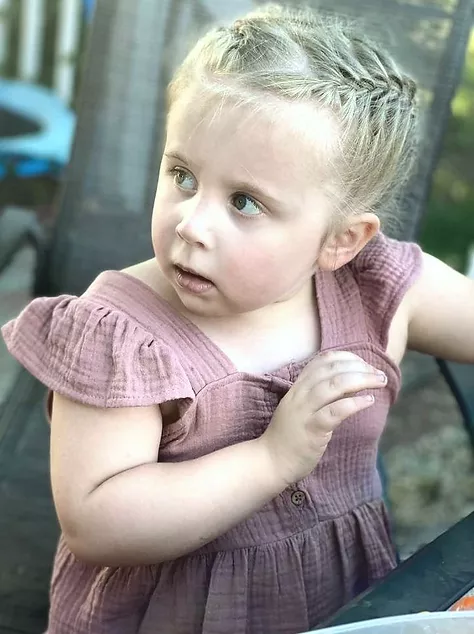
THE IMPACT OF NOT HAVING A DIAGNOSIS
What is the impact of NOT being able to get find a diagnosis?
It is hard not having a place to go or a community to go to for support. There are so many groups dedicated to bringing together people with specific medical conditions, but there aren’t really any for “Hey, your kid has a bunch of symptoms with no name.” We miss out on opportunities to find support from those types of groups because without a diagnosis we don’t really “fit” anywhere.
What would you tell a friend who was struggling with medical providers to find a diagnosis for their child?
Buckle up!!!! It’s a long ride full of emotions, bumps, smooth roads, curves, and all the things! It’s “hurry up and wait”.
I’d stress the importance of advocating, finding your tribe of support, and not being afraid to tell providers, doctors, or whoever that as a parent you will not be dismissed! You know your child better than anyone else. They see an extremely small portion of your child, and often when they are ready to perform. We as parents see every minute, and that input is valuable and needs to be acknowledged and considered.
